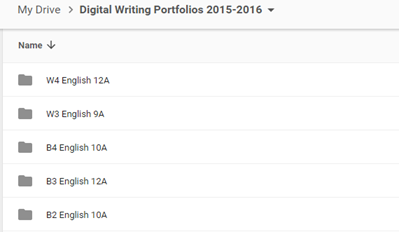Giving and Receiving Verbal Feedback on Digital Writing! by Lisa Desberg
Today we welcome a new guest writer to Writer’s Fun Zone, Lisa Desberg who is stopping by to chat with us today about “Giving and Receiving Verbal Feedback on Digital Writing!.” Enjoy!
***
This year, I challenged myself and my students to “go digital” in terms of writing submission, feedback and reflection. Every one of my 98 students created a digital writing portfolio folder in their Google Apps for Education (GAFE) account; they then shared the folder with me and provided me editing rights.
Students named their digital writing portfolio using their full name, grade and class period. Then, I organized them into 5 separate class folders in my Google Drive under 1 single folder titled Digital Writing Portfolios 2015-2016; take a look at the snapshot below.

Since students were going to submit their writing digitally, there was NO WAY I could expect them to print out their papers for me to grade with a red pen. So, it was time for me to go beyond just using Google Drive for writing and collaborating. It was time for me to use technology for effective and efficient assessment.
Well, I chatted with my school’s technology integration specialist and she suggested using the Google Add On Kaizena Mini. It’s a FREE, QUICK, EASY way for one party to offer another party verbal feedback (aligned to standards if you so choose); this can be teacher to student or student to student when peer editing. Below’s diagram shows a snip-it of what writing looks like with verbal comments embedded; of course it would be more helpful to hear it!

There are plenty of short and helpful videos on how to use Kaizena Mini like this tutorial and there are representatives who are happy to email back and forth with you, so the only other information you really need to know is what students think of receiving verbal feedback! A smart way to inform instruction and personalize learning is to listen to what students have to say .
9th, 10th and 12th grade students critique the benefits of receiving verbal feedback:
- It’s more genuine and it makes more sense hearing the feedback come straight from the teacher because it makes me understand the comments more.
- It’s a great thing that I am able to hear my teacher’s actual voice and the tone she’s trying to express rather than just reading red ink.
- It’s possible she gives me more detailed comments because she can speak it instead of writing it, and I get to listen to comments instead of seeing the traditional “good job.”
- I can get feedback wherever I am rather than waiting to see the teacher face to face or rather than just reading what she wrote on my paper. Plus, I can listen to it over and over.
- Listening to what my teacher has to say about my writing is better than trying to understand what she might circle on a rubric.
- Looking at what my teacher highlights and listening to what she has to say about it is a good and modern way of teaching and learning.
- I like hearing my teacher comment on my writing because something I might consider sarcastic or rude in writing might not be at all – it might be meant to be helpful and inspirational. Verbal feedback helps me to understand exactly what my teacher is trying to get across to me.
- Sometimes I can’t read my teachers writing or I don’t understand why they wrote what they wrote, so it’s better when they speak it and they usually elaborate more.
- It’s a good feeling to hear real comments – especially positive ones – on something I worked hard on.
- I have the ability to receive feedback on my writing even when i’m not in the classroom.
9th, 10th and 12th grade students critique the drawbacks of receiving verbal feedback:
- It’s only available online, and I’m the type of person who likes to save me work from past years and use the comments to improve my future writing.
- I’d rather have a one-on-one conversation.
- Sometimes I can’t focus on what I’m hearing.
- I can’t get Kaizena Mini on my phone.
- If I listen to feedback in class, I need headphones or else other people can hear my personal feedback.
- You have to have a computer on hand if you want to review your feedback so that might be harder for certain people.
Go on, try Kaizena Mini; give verbal feedback on the next written piece someone asks you to edit. Feel free to email me at lisa.desberg@wpsk12.com. I welcome the professional correspondence!
Update as of 1/29/2016
Wow, technology changes quickly! I wrote this blog post and BOOM, Mini Kaizena turned into Kaizena Shortcut and the features I was accustomed to using when giving verbal feedback changed. EEK!
In dramatic fashion I yelled, “WHY? WHY?” I tried some new technology and it was working for my students, it was working for me . . . for 5 months!
But, alas . . the only thing constant in life is change. Lucky for all of us interested in giving verbal feedback on writing, one of the founders Max and all of the people who work for Kaizena are extremely communicative and helpful. Just email them at help@kaizena.com! They will offer you helpful tutorials like this one, they will email back and forth with you, and if you need it, they will happily schedule a phone conference to walk you through the new.
So, maybe we should give it a try . . . again . . . that’s real life learning, after all.
***
ABOUT THE AUTHOR
 Lisa Desberg graduated with a BS from Boston University and an MEd from University of Massachusetts. She is in her 14th year of teaching English at Wilmington High School in Wilmington, Massachusetts. She has written 50,000 words for November’s National Novel Writing Month on two occasions but has never publicly shared her writing until now! This is her first blog post. She’d like to thank the technology integration specialist at her school for introducing her to many types of technology to try in her classroom. She’d also like to express her gratitude to many of her colleagues for encouraging her to step out of her comfort zone and to be great each and every day! More than anything, she’d like to acknowledge her students (past and present) for inspiring her and for making coming to school every day a lot of fun!
Lisa Desberg graduated with a BS from Boston University and an MEd from University of Massachusetts. She is in her 14th year of teaching English at Wilmington High School in Wilmington, Massachusetts. She has written 50,000 words for November’s National Novel Writing Month on two occasions but has never publicly shared her writing until now! This is her first blog post. She’d like to thank the technology integration specialist at her school for introducing her to many types of technology to try in her classroom. She’d also like to express her gratitude to many of her colleagues for encouraging her to step out of her comfort zone and to be great each and every day! More than anything, she’d like to acknowledge her students (past and present) for inspiring her and for making coming to school every day a lot of fun!






